Module 11 Body languag (共37张PPT,内嵌音频) 2023-2024学年外研版英语七年级下册课件
文档属性
| 名称 | Module 11 Body languag (共37张PPT,内嵌音频) 2023-2024学年外研版英语七年级下册课件 |
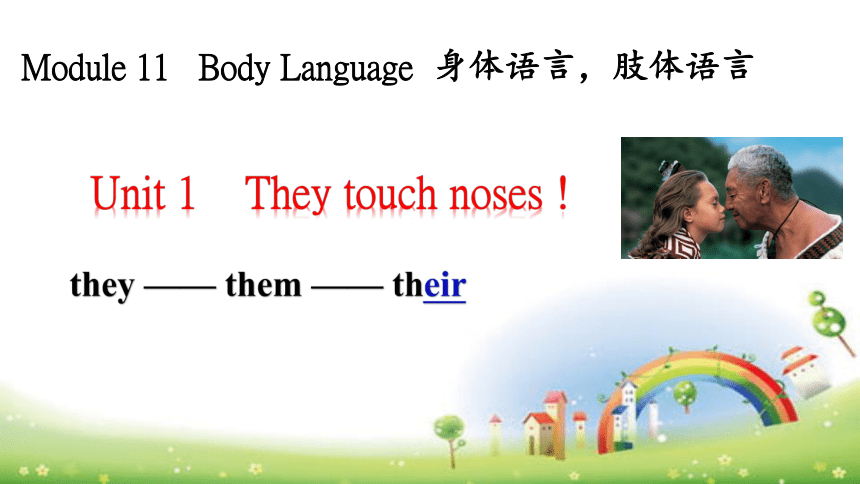
|
|
| 格式 | pptx | ||
| 文件大小 | 77.0MB | ||
| 资源类型 | 教案 | ||
| 版本资源 | 外研版 | ||
| 科目 | 英语 | ||
| 更新时间 | 2023-10-26 17:01:47 | ||
图片预览

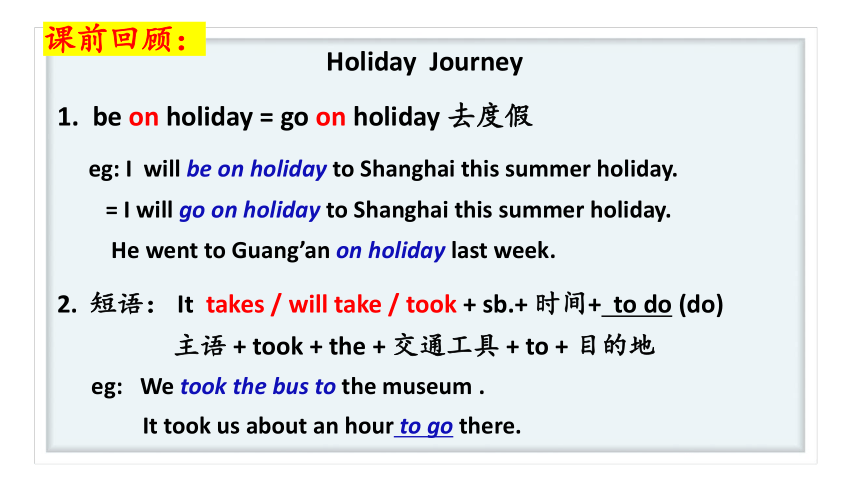

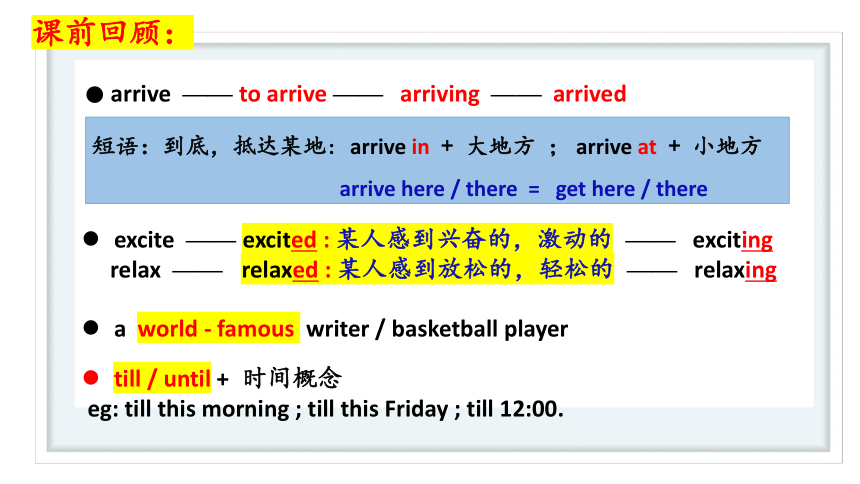
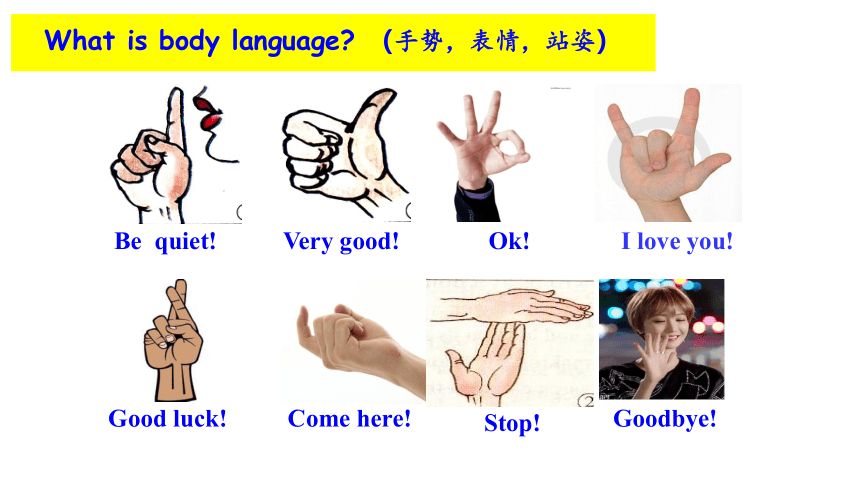
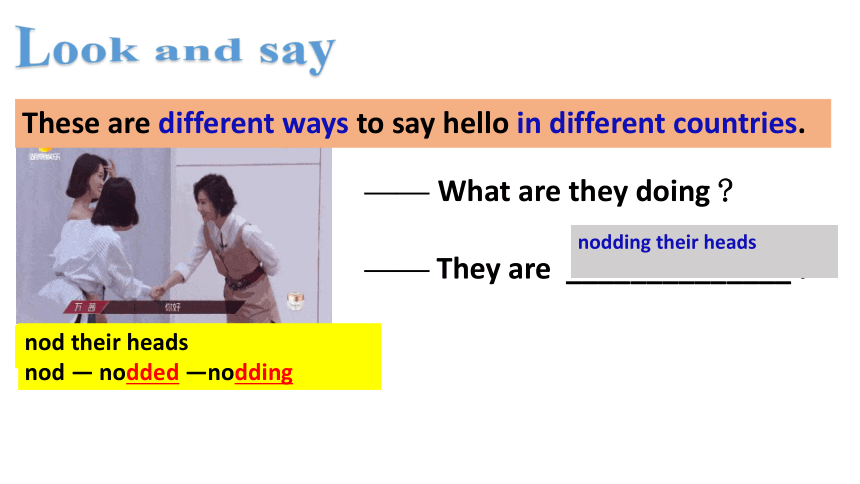
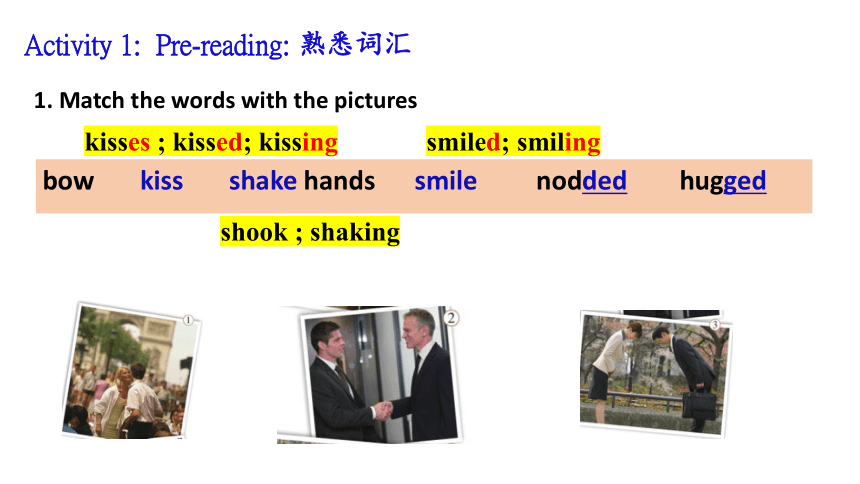
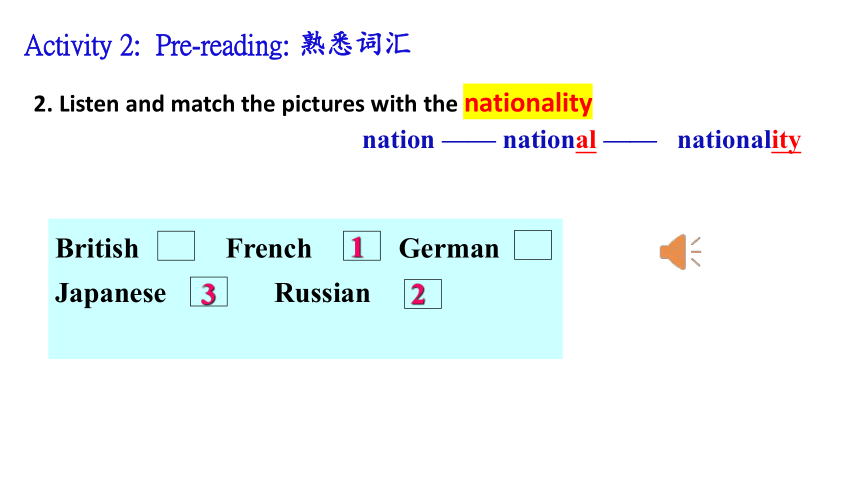

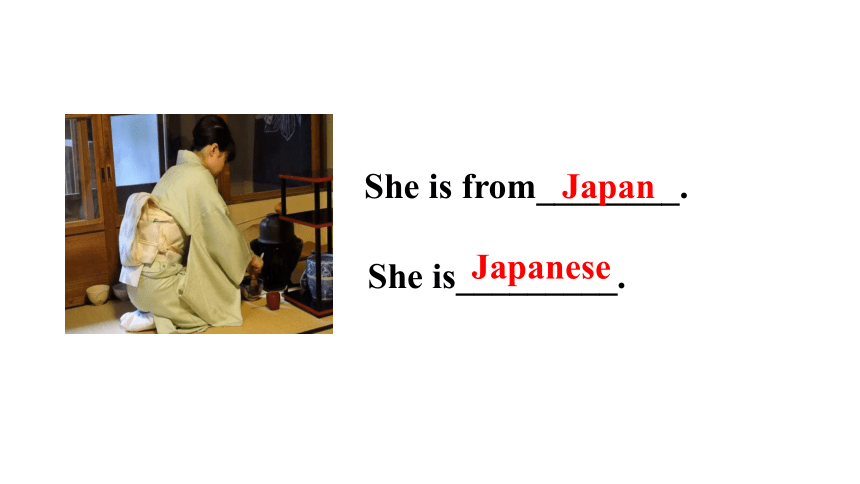
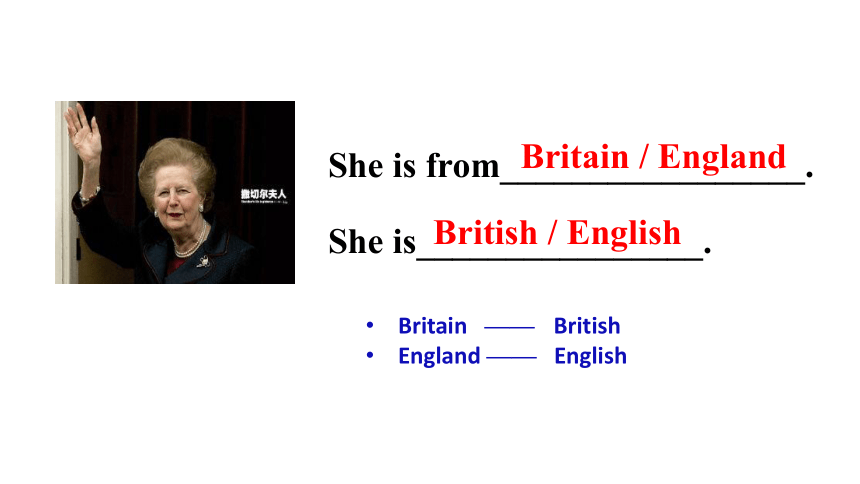
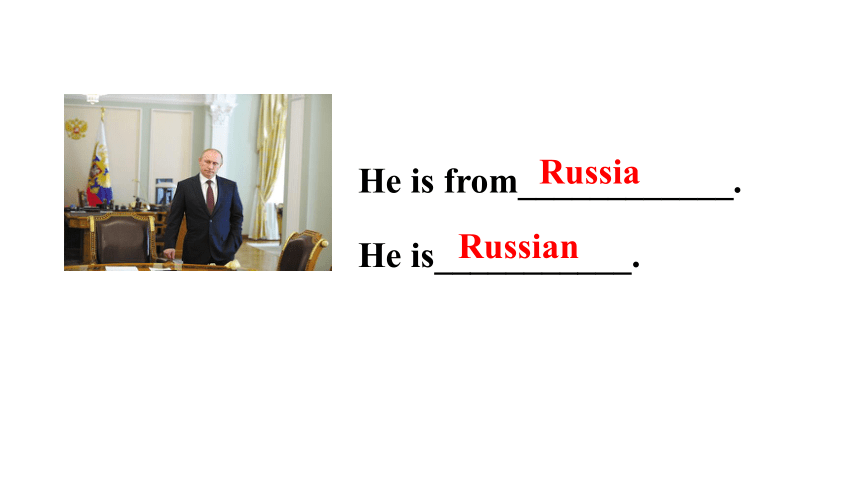
文档简介
(共37张PPT)
Module 11 Body Language 身体语言,肢体语言
Unit 1 They touch noses !
they —— them —— their
课前回顾:
Holiday Journey
1. be on holiday = go on holiday 去度假
eg: I will be on holiday to Shanghai this summer holiday.
= I will go on holiday to Shanghai this summer holiday.
He went to Guang’an on holiday last week.
2. 短语: It takes / will take / took + sb.+ 时间+ to do (do)
主语 + took + the + 交通工具 + to + 目的地
eg: We took the bus to the museum .
It took us about an hour to go there.
课前回顾:
go —— went get —— got
take —— took do —— did
see —— saw has / have —— had
enjoy —— enjoyed stay —— stayed
meet — met begin —— began
drive —— drove swim —— swam
fly —— flew sell —— sold buy —— bought
课前回顾:
arrive —— to arrive —— arriving —— arrived
短语:到底,抵达某地: arrive in + 大地方 ; arrive at + 小地方
arrive here / there = get here / there
excite —— excited : 某人感到兴奋的,激动的 —— exciting
relax —— relaxed : 某人感到放松的,轻松的 —— relaxing
a world - famous writer / basketball player
till / until + 时间概念
eg: till this morning ; till this Friday ; till 12:00.
Be quiet!
Very good!
I love you!
Good luck!
Come here!
Stop!
Goodbye!
Ok!
What is body language (手势,表情,站姿)
Look and say
—— What are they doing
—— They are ______________ .
smiling
Shake hands
shake —shook —shaking
shaking hands
bowing
kissing
kiss — kisses — kissed — kissing
hug —— hugged ——hugging
hugging each other
put their hands together
putting their hands together
nod their heads
nod — nodded —nodding
nodding their heads
These are different ways to say hello in different countries.
Activity 1: Pre-reading: 熟悉词汇
1. Match the words with the pictures
bow kiss shake hands smile nodded hugged
kisses ; kissed; kissing
shook ; shaking
smiled; smiling
Activity 2: Pre-reading: 熟悉词汇
2. Listen and match the pictures with the nationality
nation —— national —— nationality
British French German Japanese Russian
3
2
1
He is from (来自于)________.
He is____________.
课堂练习
China
Chinese
She is from________.
She is_________.
Japan
Japanese
She is from_________________.
She is________________.
British / English
Britain / England
Britain —— British
England —— English
He is from____________.
He is___________.
Russian
Russia
She is from__________.
She is_________.
India
Indian
She is from____________.
She is___________.
Germany
German
He is from____________.
He is___________.
France
French
Activity 2: Pre-reading: 熟悉词汇
2. Listen and match the pictures with the nationality
nation —— national —— nationality
国别 国人、语言
China Chinese
Japan Japanese
America American(s)
Britain / England Britain / England
Russia Russian(s)
France French
Germany German(s)
India Indian(s)
Australia Australian(s)
Activity 3-1: Pre-reading Questions:
1. How many countries are there _________________________
Five countries.
观看视频,标注出文章中的动词
Activity 3: Pre-reading Questions:
2. Who will come to Lingling’s school
_______________________________
3. Do people do different things in different countries
_______________________________
4. What do the Indian people do when they meet others
________________________________________________
Some Russian teachers.
Yes, they do.
They put their hands toghther and nod their heads.
Activity 3-2: While-reading : 自主阅读,完成表格。
Indian kiss Russian together touch visitors
1. In China , people shake hands and smile
2. American people shake hands and sometimes __________.
3. In __________, people put their hands ______________ and nod their head.
4. In __________, people kiss each other three times.
5. Maori people _________ noses.
when they meet _________
kiss
India
together
Russia
touch
visitors
Tomorrow , Linglig will welcome some ___________ teachers at school. She doesn’t know ________ to do. Betty tells her that Russian people usually kiss ________ times when they meet.
For Chinese, they often shake hands and ________ when they meet ____________.
Betty also says in the ______, people shake hands, kiss or hug each ___________. The __________ people put their ___________ together and nod their heads. And the Maori people usually _____________ noses when they meet.
So we can say people in different _____________ use different __________languages when they first meet others.
Activity 3: While-reading: 大声朗读,完成段落
Russian
what
three
smile
visitors
US
other
Indian
hands
touch
body
countries
Body
language
In the US:
__________________
__________________
Shake hands,
kiss or hug each other
In Russia:
________________________
Kiss three times, left, right, left
In China:
____________________
Shake hands and smile
In India:
_________________
_________________
Put hands together
and nod their heads
Maori people:
_____________
Touch noses
Listen again and check the sentences.:先自主完成,再听
1. People in Russia usually kiss the visitors three times, right, left, right.
2. Chinese often shake hands and smile when they meet visitors.
3. Chinese never nod their heads.
4. People in the US shake hands, and some kiss or hug each other.
5. People put their hands together and nod their heads in India.
6. Maori people touch heads when they meet.
×
√
√
√
×
left, right, left
×
sometimes
noses
Module 11 Body Language 身体语言,肢体语言
Unit 2 Here are some ways to welcome _____
them
(they)
eyes
fingers
foot —— feet
knees
legs
mouth
Activity 1: Pre-reading: 熟悉词汇
观看视频,标注出文章中的国家名称
观看视频,标注出文章中的国家名称
1. How many countries are there in the passage ________________
Seven countries.
1. What’s the passage mainly about
A. Different countries have different body language
B. We should learn body language.(意图)
C. People like using body language when they talk.
2. Where is the passage possibly from
A. a novel B. a magazine of English C. a story book
Activity 3: While-reading:
Body language around the world
Our new foreign students ___________________________(arrive) soon, and here are some ways ________________(welcome) them.
are going to arrive / will visit
to welcome
close
look at
goodbye
ways
Activity 2-1: Pre-reading Questions:
1. Is body language the same in different countries _______________
2. Is it all right to stand close to people in the Middle East _______________
3. Do the British like touching people _______________
4. Do Americans look at people when they talk _______________
5.Do people in Greece wave to say goodbye _______________
No, it isn’t.
Yes, it is.
No, they don’t.
Yes, they do.
No, they don’t.
From the passage we can know that .
A . It’s polite to wave to say goodbye in Greece
B .The British usualy look at each other when they talk
C . You can’ t stand close to people in the Middle East
D . People from all over the world like touching others
Activity 3-Para 2: While-reading:
How close do you stand when you talk to a friend
1. close v. 关闭,合上
2. close adj. 接近的,靠近的 be close to : 距离……很近
eg: Our home is very close to the supermarket.
We will get close to our dream with hard work.
stand —— stood —— standing
1. The word “ space " in Para .2 means in Chinese .
A .太空 B .房间 C .空间 D .宇宙
2. What can’t you do when you talk to North Americans
_______________________________________
We can’t stand too close to them.
Activity 3-Para 3: While-reading:
How about ______________(touch) people
_________(China) girls often _________(walk) ________________ (挽着胳膊) with __________(they) friends. South ________________ (Ameria) sometimes hold your arm when they talk to you, so you can’t move away !
But in Britain, many people _________(not) like other people to touch them at all.
touching
Chinese
walk
arm in arm
their
Americans
don’t
1. not ……at all 一点都不
eg: I do not want to go there at all. He doesn’t like Peter at all.
She was not happy / tired at all. It’s not difficult / interesting at all.
2. What do South Americans do when they talk to you .
A .hold your arm B .look somewhere else
C .no touching D .hold your fingers
1. Do South Americans walk arm in arm with their friends _________________________
2. Who don’t like other people to touch them _________________________________________________
No, they don’t .
Pre-reading Questions 任务型阅读理解
Many British people. 或者 Many people in Britain.
Activity 3-Para 4: While-reading:
Do you look at people when you talk
In some _________(place) , it isn’t _________(礼貌的) __________(look) at people when you talk, but in other ________________ (country) it isn’t polite to look somewhere __________( other / else). In Britain and the US, people usually look at each other when they talk.
places
polite
to look
countries
else
1. It’s + adj. + for sb. + to do (do)
eg: It’s relaxing for us to listen to music.
It’s wonderful to go on holiday there
2. 判断正误:
It’s always polite to look at others when you talk to them.
3. In which country, do people usually look at each other when they talk
___________________________________
x
In Britain and the US.
Activity 3-Para 5: While-reading:
And how do you say goodbye
That’s easy, wave to say goodbye. But be careful ! In Greece, it’s not at polite = It’s not polite at all. In _________(事实,真相),it’s very rude !
fact
1. What do people in Greece think of waving to say goodbye
__________________________________________________
It’s not polite at all. / It’s very rude .
Activity 2-4: Post-reading : 自主阅读,完成表格。
Britain fact foreign hold move personal polite rude someone wave
Lingling: People from ___________ countries have different body language from us. In _________, people don’t like to touch other people, but in South America, they like to ________ on to you so you can’t _________ away. Remember to give _____________ from North America lots of __________ space. In some countries, it isn’t _________ to look at people when you talk. And it isn’t polite to _________to say goodbye in Greece. In ______, it’s quite _______!
foreign
Britain
hold
move
someone
personal
polite
wave
fact
rude
n.
n.
adj.
v.
v.
adj.
adj.
adj.
pron.
v.
Module 11 Body Language 身体语言,肢体语言
Unit 1 They touch noses !
they —— them —— their
课前回顾:
Holiday Journey
1. be on holiday = go on holiday 去度假
eg: I will be on holiday to Shanghai this summer holiday.
= I will go on holiday to Shanghai this summer holiday.
He went to Guang’an on holiday last week.
2. 短语: It takes / will take / took + sb.+ 时间+ to do (do)
主语 + took + the + 交通工具 + to + 目的地
eg: We took the bus to the museum .
It took us about an hour to go there.
课前回顾:
go —— went get —— got
take —— took do —— did
see —— saw has / have —— had
enjoy —— enjoyed stay —— stayed
meet — met begin —— began
drive —— drove swim —— swam
fly —— flew sell —— sold buy —— bought
课前回顾:
arrive —— to arrive —— arriving —— arrived
短语:到底,抵达某地: arrive in + 大地方 ; arrive at + 小地方
arrive here / there = get here / there
excite —— excited : 某人感到兴奋的,激动的 —— exciting
relax —— relaxed : 某人感到放松的,轻松的 —— relaxing
a world - famous writer / basketball player
till / until + 时间概念
eg: till this morning ; till this Friday ; till 12:00.
Be quiet!
Very good!
I love you!
Good luck!
Come here!
Stop!
Goodbye!
Ok!
What is body language (手势,表情,站姿)
Look and say
—— What are they doing
—— They are ______________ .
smiling
Shake hands
shake —shook —shaking
shaking hands
bowing
kissing
kiss — kisses — kissed — kissing
hug —— hugged ——hugging
hugging each other
put their hands together
putting their hands together
nod their heads
nod — nodded —nodding
nodding their heads
These are different ways to say hello in different countries.
Activity 1: Pre-reading: 熟悉词汇
1. Match the words with the pictures
bow kiss shake hands smile nodded hugged
kisses ; kissed; kissing
shook ; shaking
smiled; smiling
Activity 2: Pre-reading: 熟悉词汇
2. Listen and match the pictures with the nationality
nation —— national —— nationality
British French German Japanese Russian
3
2
1
He is from (来自于)________.
He is____________.
课堂练习
China
Chinese
She is from________.
She is_________.
Japan
Japanese
She is from_________________.
She is________________.
British / English
Britain / England
Britain —— British
England —— English
He is from____________.
He is___________.
Russian
Russia
She is from__________.
She is_________.
India
Indian
She is from____________.
She is___________.
Germany
German
He is from____________.
He is___________.
France
French
Activity 2: Pre-reading: 熟悉词汇
2. Listen and match the pictures with the nationality
nation —— national —— nationality
国别 国人、语言
China Chinese
Japan Japanese
America American(s)
Britain / England Britain / England
Russia Russian(s)
France French
Germany German(s)
India Indian(s)
Australia Australian(s)
Activity 3-1: Pre-reading Questions:
1. How many countries are there _________________________
Five countries.
观看视频,标注出文章中的动词
Activity 3: Pre-reading Questions:
2. Who will come to Lingling’s school
_______________________________
3. Do people do different things in different countries
_______________________________
4. What do the Indian people do when they meet others
________________________________________________
Some Russian teachers.
Yes, they do.
They put their hands toghther and nod their heads.
Activity 3-2: While-reading : 自主阅读,完成表格。
Indian kiss Russian together touch visitors
1. In China , people shake hands and smile
2. American people shake hands and sometimes __________.
3. In __________, people put their hands ______________ and nod their head.
4. In __________, people kiss each other three times.
5. Maori people _________ noses.
when they meet _________
kiss
India
together
Russia
touch
visitors
Tomorrow , Linglig will welcome some ___________ teachers at school. She doesn’t know ________ to do. Betty tells her that Russian people usually kiss ________ times when they meet.
For Chinese, they often shake hands and ________ when they meet ____________.
Betty also says in the ______, people shake hands, kiss or hug each ___________. The __________ people put their ___________ together and nod their heads. And the Maori people usually _____________ noses when they meet.
So we can say people in different _____________ use different __________languages when they first meet others.
Activity 3: While-reading: 大声朗读,完成段落
Russian
what
three
smile
visitors
US
other
Indian
hands
touch
body
countries
Body
language
In the US:
__________________
__________________
Shake hands,
kiss or hug each other
In Russia:
________________________
Kiss three times, left, right, left
In China:
____________________
Shake hands and smile
In India:
_________________
_________________
Put hands together
and nod their heads
Maori people:
_____________
Touch noses
Listen again and check the sentences.:先自主完成,再听
1. People in Russia usually kiss the visitors three times, right, left, right.
2. Chinese often shake hands and smile when they meet visitors.
3. Chinese never nod their heads.
4. People in the US shake hands, and some kiss or hug each other.
5. People put their hands together and nod their heads in India.
6. Maori people touch heads when they meet.
×
√
√
√
×
left, right, left
×
sometimes
noses
Module 11 Body Language 身体语言,肢体语言
Unit 2 Here are some ways to welcome _____
them
(they)
eyes
fingers
foot —— feet
knees
legs
mouth
Activity 1: Pre-reading: 熟悉词汇
观看视频,标注出文章中的国家名称
观看视频,标注出文章中的国家名称
1. How many countries are there in the passage ________________
Seven countries.
1. What’s the passage mainly about
A. Different countries have different body language
B. We should learn body language.(意图)
C. People like using body language when they talk.
2. Where is the passage possibly from
A. a novel B. a magazine of English C. a story book
Activity 3: While-reading:
Body language around the world
Our new foreign students ___________________________(arrive) soon, and here are some ways ________________(welcome) them.
are going to arrive / will visit
to welcome
close
look at
goodbye
ways
Activity 2-1: Pre-reading Questions:
1. Is body language the same in different countries _______________
2. Is it all right to stand close to people in the Middle East _______________
3. Do the British like touching people _______________
4. Do Americans look at people when they talk _______________
5.Do people in Greece wave to say goodbye _______________
No, it isn’t.
Yes, it is.
No, they don’t.
Yes, they do.
No, they don’t.
From the passage we can know that .
A . It’s polite to wave to say goodbye in Greece
B .The British usualy look at each other when they talk
C . You can’ t stand close to people in the Middle East
D . People from all over the world like touching others
Activity 3-Para 2: While-reading:
How close do you stand when you talk to a friend
1. close v. 关闭,合上
2. close adj. 接近的,靠近的 be close to : 距离……很近
eg: Our home is very close to the supermarket.
We will get close to our dream with hard work.
stand —— stood —— standing
1. The word “ space " in Para .2 means in Chinese .
A .太空 B .房间 C .空间 D .宇宙
2. What can’t you do when you talk to North Americans
_______________________________________
We can’t stand too close to them.
Activity 3-Para 3: While-reading:
How about ______________(touch) people
_________(China) girls often _________(walk) ________________ (挽着胳膊) with __________(they) friends. South ________________ (Ameria) sometimes hold your arm when they talk to you, so you can’t move away !
But in Britain, many people _________(not) like other people to touch them at all.
touching
Chinese
walk
arm in arm
their
Americans
don’t
1. not ……at all 一点都不
eg: I do not want to go there at all. He doesn’t like Peter at all.
She was not happy / tired at all. It’s not difficult / interesting at all.
2. What do South Americans do when they talk to you .
A .hold your arm B .look somewhere else
C .no touching D .hold your fingers
1. Do South Americans walk arm in arm with their friends _________________________
2. Who don’t like other people to touch them _________________________________________________
No, they don’t .
Pre-reading Questions 任务型阅读理解
Many British people. 或者 Many people in Britain.
Activity 3-Para 4: While-reading:
Do you look at people when you talk
In some _________(place) , it isn’t _________(礼貌的) __________(look) at people when you talk, but in other ________________ (country) it isn’t polite to look somewhere __________( other / else). In Britain and the US, people usually look at each other when they talk.
places
polite
to look
countries
else
1. It’s + adj. + for sb. + to do (do)
eg: It’s relaxing for us to listen to music.
It’s wonderful to go on holiday there
2. 判断正误:
It’s always polite to look at others when you talk to them.
3. In which country, do people usually look at each other when they talk
___________________________________
x
In Britain and the US.
Activity 3-Para 5: While-reading:
And how do you say goodbye
That’s easy, wave to say goodbye. But be careful ! In Greece, it’s not at polite = It’s not polite at all. In _________(事实,真相),it’s very rude !
fact
1. What do people in Greece think of waving to say goodbye
__________________________________________________
It’s not polite at all. / It’s very rude .
Activity 2-4: Post-reading : 自主阅读,完成表格。
Britain fact foreign hold move personal polite rude someone wave
Lingling: People from ___________ countries have different body language from us. In _________, people don’t like to touch other people, but in South America, they like to ________ on to you so you can’t _________ away. Remember to give _____________ from North America lots of __________ space. In some countries, it isn’t _________ to look at people when you talk. And it isn’t polite to _________to say goodbye in Greece. In ______, it’s quite _______!
foreign
Britain
hold
move
someone
personal
polite
wave
fact
rude
n.
n.
adj.
v.
v.
adj.
adj.
adj.
pron.
v.
同课章节目录
- Module 1 Lost and found
- Unit 1 Whose bag is this?
- Unit 2 Are they yours?
- Unit 3 Language in use
- Module 2 What can you do ?
- Unit 1 I can play the piano
- Unit 2 I can run really fast
- Unit 3 Language in use
- Module 3 Making plans
- Unit 1 What are you going to do at the weekends?
- Unit 2 We're going to cheer the players.
- Unit 3 Language in use
- Module 4 Life in the future
- Unit 1 Everyone will study at home
- Unit 2 Every family will have a small plane.
- Unit 3 Language in use
- Module 5 Shopping
- Unit 1 What can I do for you?
- Unit 2 You can buy everything on the Internet
- Unit 3 Language in use
- Module 6 Around town
- Unit 1 Could you tell me how to get to the Nationa
- Unit 2 The London Eye is on your right.
- Unit 3 Language in use
- Revision module A
- Module 7 My past life
- Unit 1 I was born in a small village.
- Unit 2 I was born in Quincy.
- Unit 3 Language in use
- Module 8 Story time
- Unit 1 Once upon a time….
- Unit 2 Goldilocks hurried out of the house.
- Unit 3 Language in use
- Module 9 Life history
- Unit 1 He left school and began work at the age of
- Unit 2 He decided to be an actor.
- Unit 3 Language in use
- Module 10 A holiday journey
- Unit 1 What did you do?
- Unit 2 This morning we took a walk.
- Unit 3 Language in use
- Module 11 Body language
- Unit 1 They touch noses!
- Unit 2 Here are some ways to welcome them.
- Unit 3 Language in use
- Module 12 Western music
- Unit 1 It's so beautiful!
- Unit 2 Vienna is the centre of European classical
- Unit 3 Language in use
- Revision module B
